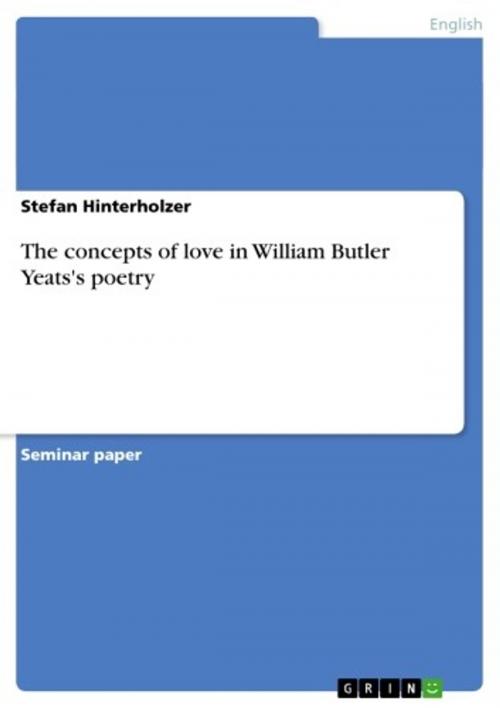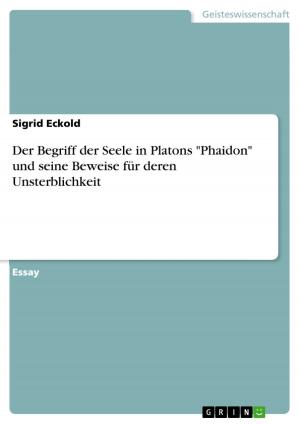The concepts of love in William Butler Yeats's poetry
Fiction & Literature, Literary Theory & Criticism, British| Author: | Stefan Hinterholzer | ISBN: | 9783638800914 |
| Publisher: | GRIN Verlag | Publication: | June 23, 2007 |
| Imprint: | GRIN Verlag | Language: | English |
| Author: | Stefan Hinterholzer |
| ISBN: | 9783638800914 |
| Publisher: | GRIN Verlag |
| Publication: | June 23, 2007 |
| Imprint: | GRIN Verlag |
| Language: | English |
Seminar paper from the year 2007 in the subject English Language and Literature Studies - Literature, grade: 1, University of Innsbruck (Department of English), course: The Irish Literary Revival, 2 entries in the bibliography, language: English, abstract: Love was one of William Butler Yeats's great inspirations. It was love that kept him moving and developing. It was love that confused him and made him reflect. It was love that shattered him and made him mourn. Yeats's experience with love was rich and fulfilling as well as frustrating and devastating. In order to come to a better understanding of Yeats's love poetry, we need to take a look into his private life: 'Yeats met the fiery revolutionary [Maud Gonne] in 1889. He fell deeply in love with her and would propose to her in 1891, 1899, 1900, 1901, and 1916. Gonne had no use for Yeats's proposals. However, she did have a use for his talents. Gonne would use Yeats for his ability as an orator. Maud Gonne, dragging him at her heels on nationalist agitations, soon found that he was a natural orator and could easily dominate committees. Maud Gonne would continue to turn Yeats proposals down, yet she continued to be the catalyst for the finest love poetry Yeats would ever create. Gonne would once ask for Yeats's help in London, ending a brief but happy love affair with Olivia Shakespear. Sensing divided loyalty, Shakespear would end the affair and it was shortly thereafter that Lady Gregory would save Yeats from a potentially more tragic end, like the poets of the tragic generation' (cf. nadn.navy). Yeats really loved Maud Gonne. She was the love of his life, and still, she would never really react to, let alone return his love. Yeats has experienced the many different facets of love through this continuous interaction between his everlasting true and sincere affection and dedication and her cold and calculating rejection. But although this may be a personal tragedy it also resulted in something positive and beautiful, namely Yeats's love poetry Maud Gonne inspired him to. Yeats managed to deal with all his positive and negative experiences in a productive way and included them into his poetry. Maud Gonne once even said to him that she could not stop rejecting him as he would not write such beautiful poetry about her anymore then. As said, Yeats's perception and concepts of love can be identified in his poetry. Furthermore, we can identify a development of Yeats's depiction of love in his poetry. We can find many different sides of love in Yeats's poems. In some poems, Yeats describes it as an almost divine power. In other poems, he starts doubting whether love is really that fulfilling or not. And in further poems, he even focuses on the dark and destructive sides of love. These different concepts of love will be described in this paper through the analysis of selected poems.
Seminar paper from the year 2007 in the subject English Language and Literature Studies - Literature, grade: 1, University of Innsbruck (Department of English), course: The Irish Literary Revival, 2 entries in the bibliography, language: English, abstract: Love was one of William Butler Yeats's great inspirations. It was love that kept him moving and developing. It was love that confused him and made him reflect. It was love that shattered him and made him mourn. Yeats's experience with love was rich and fulfilling as well as frustrating and devastating. In order to come to a better understanding of Yeats's love poetry, we need to take a look into his private life: 'Yeats met the fiery revolutionary [Maud Gonne] in 1889. He fell deeply in love with her and would propose to her in 1891, 1899, 1900, 1901, and 1916. Gonne had no use for Yeats's proposals. However, she did have a use for his talents. Gonne would use Yeats for his ability as an orator. Maud Gonne, dragging him at her heels on nationalist agitations, soon found that he was a natural orator and could easily dominate committees. Maud Gonne would continue to turn Yeats proposals down, yet she continued to be the catalyst for the finest love poetry Yeats would ever create. Gonne would once ask for Yeats's help in London, ending a brief but happy love affair with Olivia Shakespear. Sensing divided loyalty, Shakespear would end the affair and it was shortly thereafter that Lady Gregory would save Yeats from a potentially more tragic end, like the poets of the tragic generation' (cf. nadn.navy). Yeats really loved Maud Gonne. She was the love of his life, and still, she would never really react to, let alone return his love. Yeats has experienced the many different facets of love through this continuous interaction between his everlasting true and sincere affection and dedication and her cold and calculating rejection. But although this may be a personal tragedy it also resulted in something positive and beautiful, namely Yeats's love poetry Maud Gonne inspired him to. Yeats managed to deal with all his positive and negative experiences in a productive way and included them into his poetry. Maud Gonne once even said to him that she could not stop rejecting him as he would not write such beautiful poetry about her anymore then. As said, Yeats's perception and concepts of love can be identified in his poetry. Furthermore, we can identify a development of Yeats's depiction of love in his poetry. We can find many different sides of love in Yeats's poems. In some poems, Yeats describes it as an almost divine power. In other poems, he starts doubting whether love is really that fulfilling or not. And in further poems, he even focuses on the dark and destructive sides of love. These different concepts of love will be described in this paper through the analysis of selected poems.















